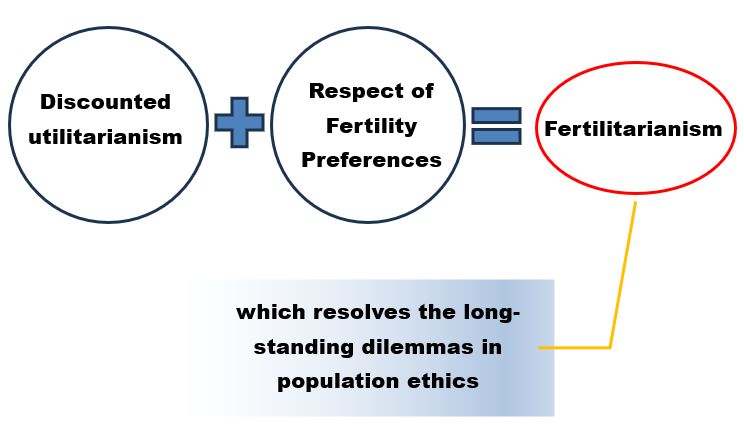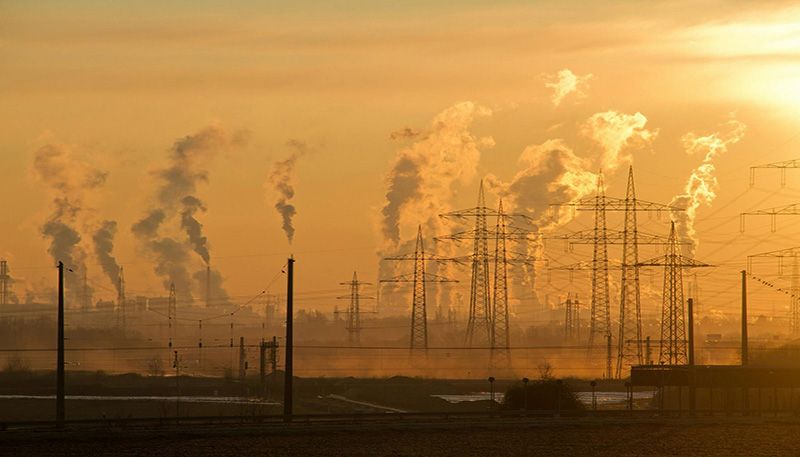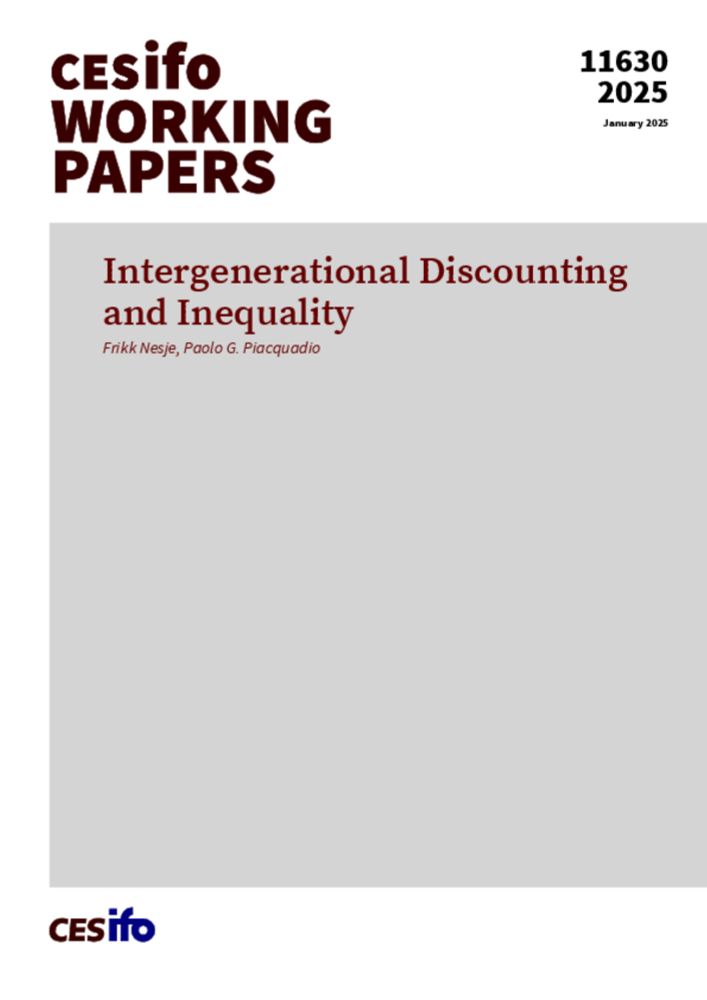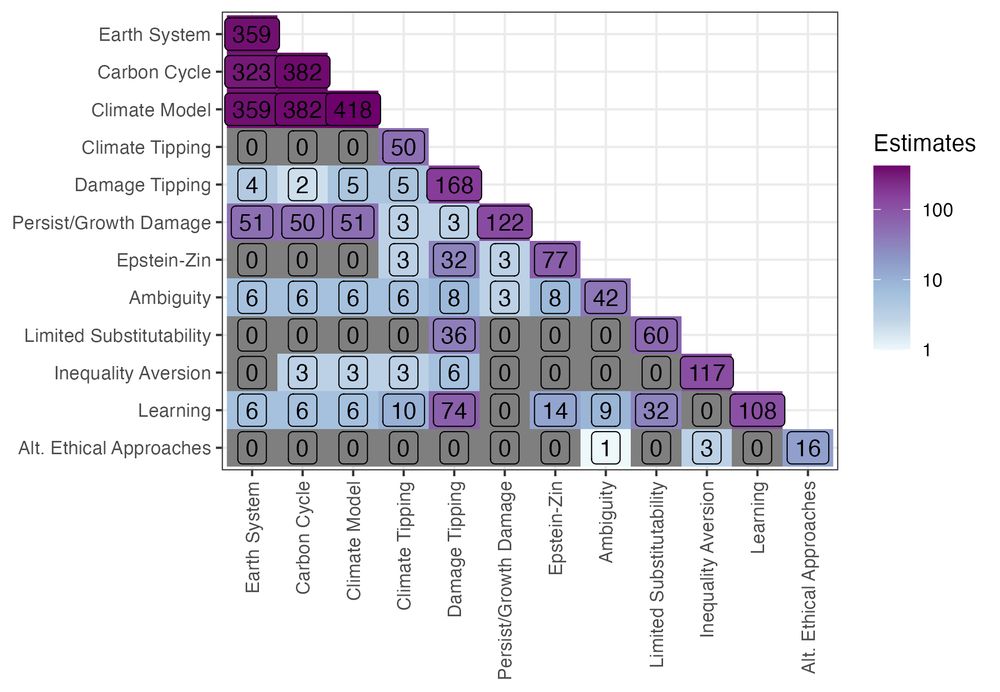
New publication: Designing Carbon Pricing Policies Across the Globe with Robert Schmidt and @moritzdrupp.bsky.social in Environmental and Resource Economics!
We present the largest international expert survey on carbon pricing design (400+ participants, ~40 countries). Some highlights.
03.10.2025 07:53 — 👍 20 🔁 8 💬 1 📌 1
Many congratulations and welcome to Zürich!!
03.09.2025 17:37 — 👍 1 🔁 0 💬 0 📌 0

Working paper alert!
I generalize discounted utilitarianism to endogenous population settings and avoid most drawbacks of existing welfare criteria.
Read more here: www.ifo.de/DocDL/cesifo....
Comments are welcome!
01.09.2025 09:04 — 👍 6 🔁 3 💬 0 📌 1
Conclusion:
Tackling climate change & inequality requires an integrated perspective. Neither challenge can be fully understood in isolation—nor can policy succeed if it ignores their interdependence. We close with thoughts on a roadmap for future research at the inequality-environment nexus.
01.09.2025 11:28 — 👍 5 🔁 1 💬 1 📌 0
3️⃣ Redistribution (e.g. carbon dividends) can overturn potentially regressice policy costs, but has an ambiguous effect on environmental outcoems.
01.09.2025 11:28 — 👍 1 🔁 0 💬 1 📌 0
What does the evidence to date say?
1️⃣ Environmental benefits (like cleaner air) are often distributed pro-poor.
2️⃣ Policy costs (like carbon taxes) can be regressive—but context and design matters.
01.09.2025 11:28 — 👍 2 🔁 1 💬 1 📌 0
We highlight three key channels linking inequality and the environment:
1️⃣ How environmental benefits vary with income
2️⃣ How policy costs are distributed across households
3️⃣ How inequality and redistribution shape environmental outcomes
01.09.2025 11:28 — 👍 1 🔁 0 💬 1 📌 0
Summary:
Environmental degradation and economic inequality are two defining challenges of the 21st century. In this article, we synthesize how they interact—and why reseacher and policymakers should not treat them in isolation.
01.09.2025 11:28 — 👍 1 🔁 0 💬 1 📌 0
🌍📈 Paper “The Economics of Inequality and the Environment” out today in the Journal of Economic Literature @aeajournals.bsky.social, joint with Jasper Meya, Lutz Sager & Ulrike Kornek.
See short summary and PM by PIK linked below, and the paper here
👉 pubs.aeaweb.org/doi/pdfplus/...
01.09.2025 11:28 — 👍 25 🔁 13 💬 2 📌 0

Graph showing the evolution of transport fuel taxes in Germany and OECD average.
Fuel and carbon prices are typically assessed based on their effectiveness in reducing emissions, while their broader societal benefits often go overlooked. This column evaluates one of the world’s largest environmental tax experiments – Germany’s eco-tax reform – and finds that it led to sizable reductions not only in carbon emissions but also in harmful local air pollutants. Estimates reveal that two-thirds of the monetised benefits of the eco-tax stemmed from health gains linked to cleaner air and accrued disproportionately to lower-income and more polluted areas, suggesting that fuel taxes can deliver pro-poor environmental gains, even when their cost incidence is regressive.
Germany's eco-tax reform led to sizable reductions not only in carbon emissions but also in harmful local air pollutants. Benefits accrued disproportionately to lower-income and more polluted areas.
Piero Basaglia, Sophie Behr, @moritzdrupp.bsky.social
cepr.org/voxeu/column...
#EconSky
20.08.2025 08:15 — 👍 29 🔁 14 💬 0 📌 0

ETH Zurich is seeking to hire an Assistant Professor (Tenure Track) of Decision Sciences. D-MTEC
Contact person: Torbjørn Netland
Details and Application: ethz.ch/en/the-eth-z...
06.06.2025 14:25 — 👍 3 🔁 3 💬 0 📌 0

A large industrial area featuring power lines emitting smoke against a cloudy sky.
How much does carbon pollution really cost society? In the latest Science Sessions episode, Frances Moore discusses new research suggesting the social cost of carbon is higher than previously estimated. Listen now: www.pnas.org/post/podcast...
25.03.2025 18:54 — 👍 15 🔁 7 💬 0 📌 0
Many congratulations to @pbasaglia.bsky.social & @fpavanello.bsky.social & big thanks to @auffhammer.bsky.social & @waldomarz.bsky.social as well as the whole @cesifo.org team for organizing yet another great workshop!!
15.03.2025 19:11 — 👍 5 🔁 0 💬 0 📌 0
Many congratulations, Leonie 🎉
05.03.2025 16:24 — 👍 1 🔁 0 💬 0 📌 0
Very glad to be visiting this week and looking forward to the discussions!
04.03.2025 08:54 — 👍 1 🔁 0 💬 0 📌 0
Check out this great paper by @felixschaumann.bsky.social with @edualastrue.bsky.social out now in @pnas.org that integrates climate science with climate economics to study the social cost of carbon implications of reduced AMOC weakening. Super impressive work for a first PhD chapter👇
25.02.2025 21:04 — 👍 10 🔁 2 💬 0 📌 0

Intergenerational Discounting and Inequality
We study all theories of justice that disentangle ethical views on intergenerational discounting and intergenerational inequality. Each “modular” social welfare function is uniquely identified by a ti...
"Intergenerational Discounting and Inequality" (joint with @pgpiacquadio.bsky.social) is now out as a working paper!
We study all theories of justice that disentangle intergenerational discounting and intergenerational inequality, and I am amazed by the results!
www.cesifo.org/en/publicati...
23.01.2025 12:36 — 👍 18 🔁 9 💬 1 📌 1
Don’t have a particular insight into the ruling, but the product has protected my head very well when I got hit by a truck on the bike, so it’s very sad to see this discontinued.
15.01.2025 18:01 — 👍 4 🔁 0 💬 0 📌 0
Two environmental economics contributions among the 10 featured AEA charts 2024 @frikknesje.bsky.social @eyalfrank.bsky.social
happy holidays everyone 🎄🎄
23.12.2024 11:01 — 👍 15 🔁 3 💬 0 📌 0
ctraeger.bsky.social
Christian Traeger @ctraeger.bsky.social has joined BlueSky.
Follow him for great work on
• Environmental, Resource & Climate Economics
• Economic Dynamics
• Risk, Uncertainty, & Decision Theory
Among others, Christian has developed a whole model world: the Analytic Climate Economy (ACE)
19.12.2024 12:33 — 👍 6 🔁 2 💬 0 📌 0

I'd say there is a strong case to be made that more philosophising is needed in SCC-work. @paulkelleher.net, we had a structural extension category "Alternative Ethical Approaches", which didn't make it into our featured categories due to low N & is also rarely coupled with other extensions (Fig S4)
18.12.2024 22:00 — 👍 5 🔁 0 💬 1 📌 0
😅 this was also the most difficult survey yet to answer that I've sent out - but I had a hunch that you'd enjoy some of the qualitative comments 😀 I think a combination of what determines what we call the "SCC wedge" plus qual-comments is a useful indication for where SCC research may be headed
18.12.2024 07:44 — 👍 3 🔁 0 💬 2 📌 0
Check out this thread by @climatefran.bsky.social on our new paper in @pnas.org out today providing most comprehensive (i.e. still incomplete) evidence on the social cost of CO2 (SCC), with a meta-analysis + expert survey & a combination of elements of both to generate a “synthetic SCC” (mean≈$280)👇
17.12.2024 23:00 — 👍 17 🔁 4 💬 0 📌 0
Many congratulations, Christina, sounds like a great project!
16.12.2024 22:25 — 👍 1 🔁 0 💬 0 📌 0
With our teaching, we seek to stir students’ enthusiasm for the possibilities in which economic theories & empirical methods can help to better understand and manage sustainability challenges. We furthermore actively contribute to the societal debate & help to improve public policy.
12.12.2024 12:00 — 👍 1 🔁 0 💬 0 📌 0
We publish our work in general economics journals (e.g. AEJ: Policy, JEL @aeajournals.bsky.social), field journals (e.g. JEEM @jeem-econ.bsky.social), & interdisciplinary journals (e.g. PNAS @pnas.org, Science @science.org).
12.12.2024 12:00 — 👍 2 🔁 0 💬 1 📌 0
We draw on a diversity of methods, including theory, modelling & empirical approaches (surveys, experiments, quasi-experimental designs), often in international, interdisciplinary & transdisciplinary cooperation.
12.12.2024 12:00 — 👍 0 🔁 0 💬 1 📌 0
(iii) analysing fundamental preferences and sustainability-relevant behaviours, &
(iv) accounting for the limited substitutability of nature when measuring & managing sustainable development.
12.12.2024 12:00 — 👍 0 🔁 0 💬 1 📌 0
Our group seeks to inform & support the transition to sustainable futures. We currently focus on 4 areas:
(i) studying the efficacy and distributional effects of environmental policies,
(ii) exploring concepts of intergenerational justice, such as to improve estimates of the social cost of carbon,
12.12.2024 12:00 — 👍 1 🔁 0 💬 1 📌 0
If, in line with @ethzurich.bsky.social principles, you also seek to drive innovation, act responsibly, live inclusively, nurture well-being, build bridges and enable people to support the transition to sustainable futures, then the Sustainability Economics Group might be the right place for you!
12.12.2024 12:00 — 👍 0 🔁 0 💬 1 📌 0
Researcher @uniLeipzig.bsky.social & @rsc4earth.bsky.social
My work: #PHENOPLEXITY
= #nonlinearDynamics + #complexity + #ML
Analyses: plant #phenology & #biodiversity.
Data: #citizenscience, #remoteSensing, #sentinel2, #eddycovariance, #DataCubes, #TLS
Connecting Biodiversity, Climate, and Human Behaviour.
🌍 CBC2026📍Leipzig, Germany 🗓 Sept 21-24, 2026
🔗 More information: https://cbc-conference.org/
Co-organized by @ufz.de and @unileipzig.bsky.social.
Mother of boy 👨👩👧/Nature lover 🌲🌻🌿 /NFM/Employed by @Leep_Institute as Impact Fellow
Senior Research Economist at Bank of England | Climate macro. Views are my own.
https://sites.google.com/view/francescadiluiso/
Ph.D. Candidate in Environmental Economics @resec_umass @UmassAmherst | Studying the link between environmental exposures and mental health | sparshisrivastava.com
Associate professor at Tufts University working in macro-labor, macro-climate, and international macroeconomics. Views are my own.
https://sites.google.com/view/alanfinkelsteinshapiro
Climate scientist focusing on health risks, adaptation, mitigation, co-benefits, scenarios
#UKRIFLF Future Leaders Fellow and Associate Prof at University of Bristol, climate scientist investigating how to improve climate information for adaptation. She/her.
Assistant Professor @ucsantabarbara Global Change Forest Ecologist @switzernetwork @SmithFellows @PeaceCorps #BLM
I'm an Assistant Professor of Economics at Comillas ICADE in Madrid. I work on International Trade Policy, International Business, Political Economy, and Economic Development. In 🇪🇸 via 🇺🇸 & 🇬🇧 from 🇺🇾
https://www.orianamontti.com
Redakteur im Politischen Feuilleton der ZEIT
Dad, Partner. Statistician-Econometrician-Engineer. AI Developer. Decision theory. Game theory. #autisticpride #9 at Zapier, first DS
Ausgezeichneter Journalist. (DUH, medium-magazin, 2-fache Grimme Nominierung). Diplom-Meteorologe. Weather & Climate Presenter. Moderator. Speaker. Autor. Born: CO₂ 326 ppm. Fernmeldeanlagen-Elektroniker.
Naturwissenschaftler (Polymerchemie). Hochschullehrer (Physikalische Chemie). Im dynamischen Nichtgleichgewicht.
Economist ensuring that the energy transition is just!
Economist at Environmental Defense Fund | Macroeconomist interested in environmental policy and labor markets | Formerly: RFF, ASU, ITAM, SHCP
Historian. Coffee drinker
Energy systems modeling, economics, policy | IPCC, NCA, Stanford/CMU alum | Views my own
Postdoc & MSCA Fellow @geomar.de 🌊
Ocean scientist | Phytoplankton lover
Environmental Economist.
University of Montevideo, Uruguay.
Postdoc au CEE-M
Environmental justice
https://sites.google.com/view/camille-salesse







